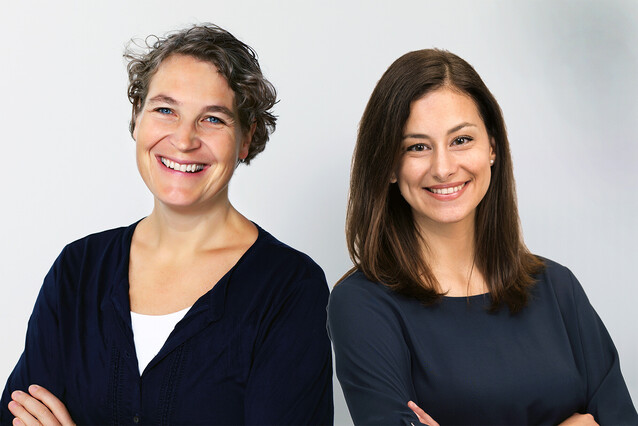Anna Obenauf and Andrea Pauli promoted to Senior Scientists
As of October 2022, IMP junior group leaders Andrea Pauli and Anna Obenauf will become senior scientists. The decision, which follows a thorough evaluation, puts a spotlight on the exceptional achievements of the two scientists – in research, but also as mentors, communicators, and important contributors to the community at the IMP and wider Vienna BioCenter.
“The promotions of Andrea Pauli and Anna Obenauf are based on their great scientific achievements as IMP Group Leaders and the promise that their research plans hold for the future,” said IMP Scientific Director Jan-Michael Peters in welcoming the decision. “The promotions will strengthen some of the key research areas in which the IMP is active: developmental biology and mechanistic molecular cell biology in the case of Andrea Pauli, and cancer research and immunology in the case of Anna Obenauf. I am looking forward to exciting future discoveries that their laboratories will make at the IMP.”
Anna Obenauf joined the IMP as a junior group leader in 2016. Here, Obenauf and her lab study the molecular programs that drive the progression and immune evasion of metastatic cancer, to develop therapeutic strategies that result in durable responses.
The lab of Anna Obenauf has discovered that melanomas, which acquire resistance to targeted therapies, simultaneously acquire cross-resistance to immunotherapy. The Obenauf Lab showed that this cross-resistance is induced by a ‘rewired’ MAPK signalling pathway, which activates a gene expression program that underlies resistance to immunotherapy. Obenauf and her lab have also developed an innovative lineage tracing method called “CaTCH”, with which tumour founding clones can be retrospectively isolated from millions of cells prior to evolutionary selection. By using this technology, the scientists found that resistance to targeted therapies via mutations and epigenetic changes is often acquired during tumour evolution rather than pre-existing. Other important findings of the Obenauf Lab include the identification of new therapeutic approaches for rare cancers such as Merkel cell carcinoma.
Anna Obenauf studied molecular biology at the University of Graz. In 2010, she obtained her PhD in molecular medicine from the Medical University of Graz. Following her PhD, she joined the lab of Joan Massagué at Memorial Sloan Kettering Cancer Center as a postdoctoral researcher. Anna Obenauf is recipient of the ASCINA Prize of the Federal Ministry of Education, Science and Research (2015), a Vienna Science and Technology Fund grant (2017), an ERC Starting Grant (2018), and an ALS Foundation grant (2022). In 2019, she was elected to the Young Academy of the Austrian Academy of Sciences and since 2021 she is an EMBO Young Investigator.
Andrea Pauli’s history with the IMP goes back to 2004, when she started her PhD in the labs of Barry Dickson and Kim Nasmyth. Two years later, she transferred to Oxford with Kim Nasmyth and returned to the IMP as a group leader in 2015. Research in Andrea Pauli’s lab links developmental biology with biochemistry, genomics and molecular and cell biology in order to uncover essential mechanisms underlying the egg-to-embryo transition. The lab uses zebrafish as its main model system.
Andrea Pauli and her lab have discovered mechanisms underlying embryo morphogenesis, fertilisation, and egg dormancy. This includes the discovery that the protein Toddler acts as a guidance cue which steers the directional migration of mesodermal cells via a single-receptor-based self-generated gradient. Focusing on fertilisation, Pauli and her lab identified the egg protein Bouncer as an essential factor for sperm-egg recognition in fish: Bouncer is essential for sperm entry into the egg and sufficient to switch the species-specificity of fertilisation between zebrafish and medaka. Studying the mechanistic basis of dormancy in the egg, Pauli’s lab discovered a developmentally programmed, conserved dormant ribosome state important for ribosome storage and translational repression.
Andrea Pauli studied biochemistry in Regensburg and molecular and cellular biology in Heidelberg, followed by her aforementioned doctoral studies with Kim Nasmyth at IMP and Oxford. She joined the lab of Alexander Schier at Harvard as a postdoctoral researcher in 2009. Apart from leading her research group at the IMP, Pauli teaches summer courses at the Woods Hole Marine Biological Laboratory and is dean of the Vienna BioCenter summer school. Andrea Pauli was elected EMBO member in 2021 and EMBO Young Investigator in 2018. She is recipient of an ERC Consolidator Grant (2022), an HFSP Young Investigator Grant (2020), a Whitman Center Early Career Fellowship (2018), a Start Prize of the Austrian Science Fund FWF (2017), and an HFSP Career Development Award (2015).
